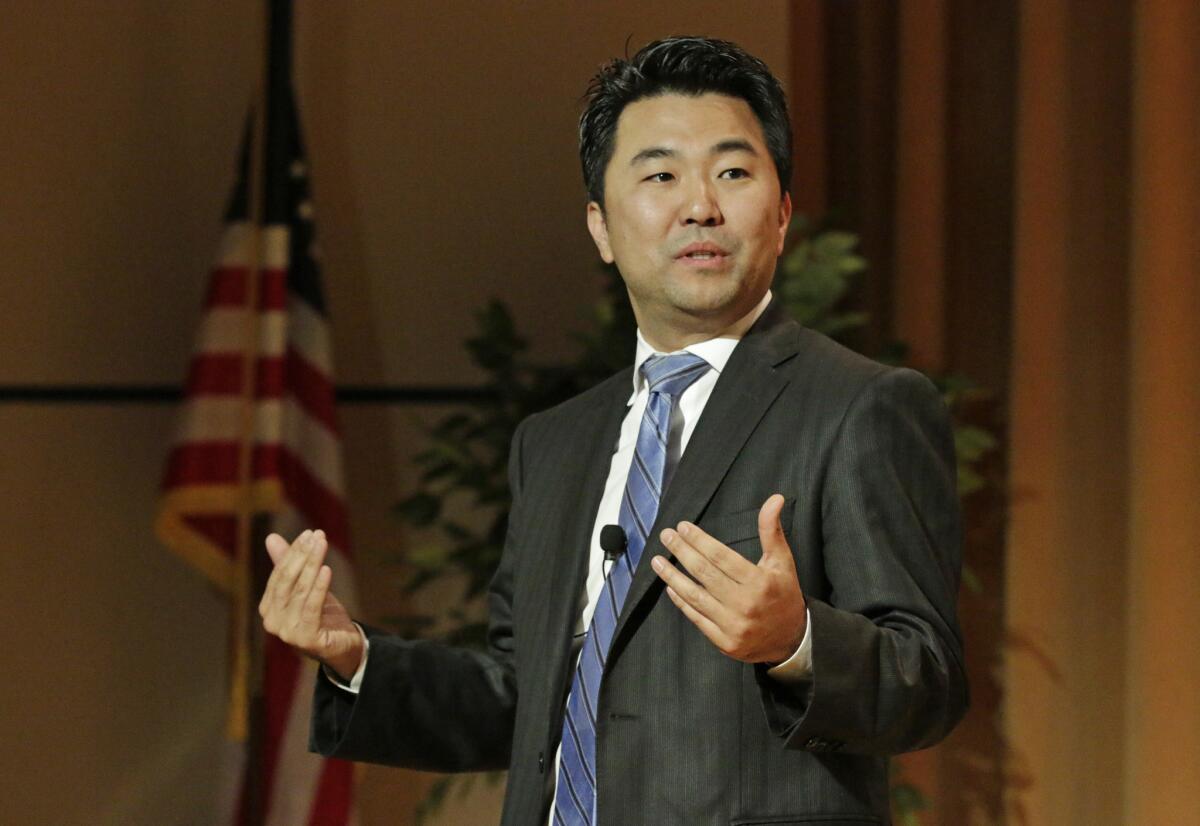L.A. politicians propose banning campaign contributions from developers

- Share via
Real estate developers have long been a pivotal part of political fundraising at Los Angeles City Hall, bankrolling the campaigns of mayors, City Council members and other elected officials.
That phenomenon has fueled persistent suspicions that campaign contributions — not established planning rules — influence the votes of local lawmakers as they approve shopping malls, hotel towers and other building projects.
Now a handful of Los Angeles lawmakers are calling for a ban on such donations from real estate developers, saying they want to counter the perception that money drives those decisions.
The proposal, unveiled Tuesday by City Council members David Ryu, Joe Buscaino, Paul Krekorian, Paul Koretz and Mike Bonin, would direct city officials to draft a new law that would prohibit donations from development companies and their principals during, and shortly after, city reviews of their building projects.
“There has been a widely held perception that bad development decisions get made at the city as a result of the relationships that developers have with council members through campaign contributions,” Krekorian said. “And I think it’s important that we dispel that perception.”
The ban is being pushed at a time of increased scrutiny of real estate developers, their fundraising activities and their political clout at City Hall.
With a municipal election two months away, Mayor Eric Garcetti and several council members face challengers who have been highlighting public frustration over large-scale development projects. A bruising campaign is underway over a ballot measure that would temporarily halt the approval of some building projects.
The proposed ban also follows a series of stories by The Times about the influx of political contributions as development projects are reviewed at City Hall.
In October, a Times investigation found that donors with direct and indirect ties to real estate developer Samuel Leung gave more than $600,000 to support L.A.-area politicians as his 352-unit Sea Breeze apartment project was being vetted at City Hall. Sea Breeze was approved over the objections of both city planners and Garcetti’s own appointees.
The Times also examined campaign contributions made by businessman Rick Caruso, the developer of a 20-story apartment project being considered near the Beverly Center. Caruso and his associates have provided more than $476,000 to L.A. politicians and their pet causes over the last five years.
Backers of Measure S, which takes aim at development projects that need zoning changes and other special approvals, praised council members for proposing the ban. But they also said the proposal backed up their claim that donations are corrupting the planning process.
“It’s an admission of guilt,” said Richard Close, president of the Sherman Oaks Homeowners Assn. and a proponent of Measure S.
Opponents of Measure S said they were also pleased by the proposed ban, arguing that it tackles issues the ballot measure fails to address. But some business leaders questioned the narrow focus on developers. Stuart Waldman, president of the Valley Industry and Commerce Assn., argued that are other donors also have a stake in the city’s planning process.
“If they’re going to ban contributions from developers, then they should ban them from labor unions too,” Waldman said.
Los Angeles already prohibits political contributions from companies that are bidding on city contracts. Expanding that ban to real estate interests could spark a legal challenge, experts said.
“If you’re a real estate developer who is suddenly told that you can’t contribute, I think there’s no question that a challenge would be brought,” said Derek Muller, associate professor at Pepperdine University School of Law. “It would be a close call for a court.”
Ryu, one of the authors of the proposed ban, pledged not to accept campaign contributions from developers with current or upcoming city projects when he ran for office in 2015. The city should ban such donations citywide to restore trust with voters, he said.
Still, the proposal may not ultimately cover some of the biggest recipients of developers’ money. A Ryu spokesman said the initiative would likely not apply to city ballot measure committees, which can accept donations of any size, or “behested” donations, which are made to charities or other organizations at an elected official’s request.
In addition, one political consultant said he fears that a prohibition on giving would simply prompt real estate developers to direct their money into “independent expenditure” committees. Those campaign committees cannot coordinate their activities with the candidates they support. They also face no legal limits on how much money they can accept.
Those committees would then spend big on behalf of their favored candidates, said political consultant Michael Soneff. Money would shift to committees that lack contribution limits and accountability, he said.
Three of the five council members who signed the proposal — Buscaino, Bonin and Koretz — are running in the March 7 election. Bonin and Koretz, as well as other incumbents, face challengers who have publicly promised not to accept campaign contributions from developers seeking city approval for their projects.
Among them is attorney Jesse Max Creed, who is running against Koretz and described the proposed ban as “cynical.” Koretz has long had the opportunity to stop such contributions and is only doing so now during a reelection fight, Creed said.
“My campaign is calling Koretz out for his real estate contributions, and now he’s trying to be a born-again good-government person,” he said.
Koretz said as recently as six months ago, the council would not have been able to muster enough votes to carry out a developer donation ban. But the Measure S campaign and The Times’ coverage of developer contributions have fueled a public perception that there is a “pay-to-play culture” at City Hall, he said.
Koretz said he does not believe such a culture exists. But it’s time to address the perception, he said.
“That’s not a good reputation for the city to have, whether it’s real or not,” he said.
Twitter: @davidzahniser
Twitter: @LATimesEmily
UPDATES:
5:15 p.m.: This article was updated with additional reporting and editing.
1:55 p.m.: This article was updated with a response from Councilman Paul Koretz to criticism from his opponent.
1:15 p.m.: This article was updated with additional details and reaction to the proposal.
This article was originally published at 11:25 a.m.
More to Read
Sign up for Essential California
The most important California stories and recommendations in your inbox every morning.
You may occasionally receive promotional content from the Los Angeles Times.











